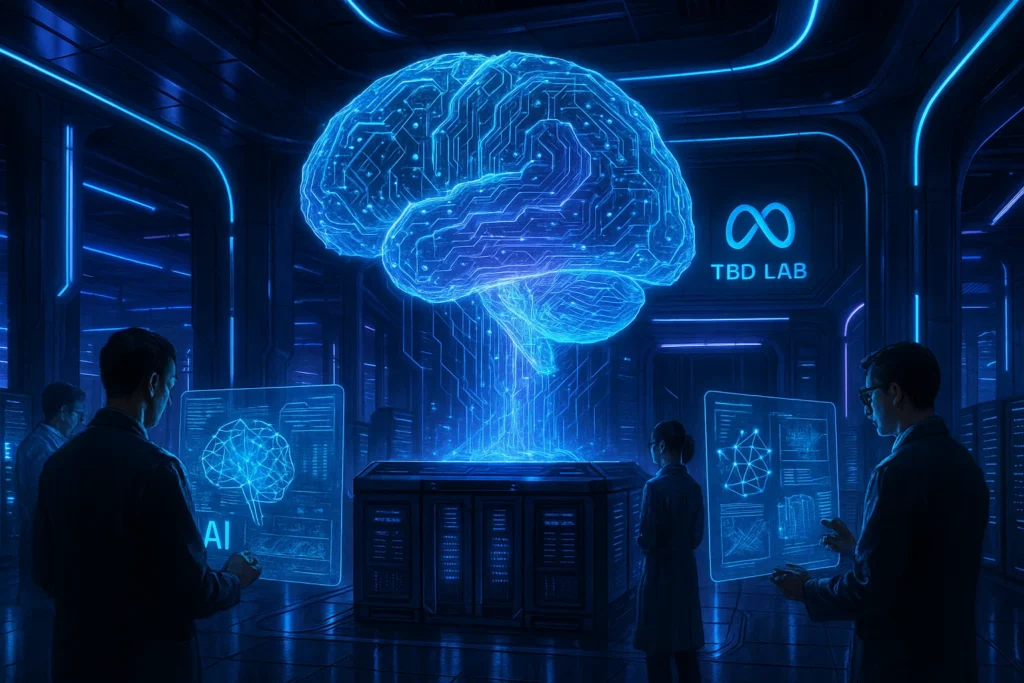Discover how Meta’s TBD Lab is shaping the future of superintelligent AI in 2025 with groundbreaking models redefining technology, work, and society.
Meta’s TBD Lab: The Next Big Model in Superintelligent AI 2025
Artificial Intelligence (AI) has been at the center of global innovation for over a decade, but 2025 marks a defining moment. Meta, formerly Facebook, is positioning itself at the forefront of this technological evolution with its secretive yet ambitious TBD Lab initiative. The project is rumored to be preparing the next big model in superintelligent AI, a system that could reshape industries, redefine digital interaction, and challenge our very understanding of machine intelligence.
This article takes you deep into Meta’s vision, the role of TBD Lab, the potential impact of its upcoming AI model, and what this means for the U.S. and global economy.
1. What is Meta’s TBD Lab?
Meta’s TBD Lab—short for “To Be Determined”—is a research hub formed in 2023 with a singular mission: to push the limits of frontier AI models. While OpenAI, Google DeepMind, and Anthropic have captured headlines with ChatGPT, Gemini, and Claude, Meta has been quietly building the infrastructure to go further.
Unlike conventional AI research groups, TBD Lab is structured more like a startup within Meta, giving researchers autonomy to experiment at a faster pace. The lab brings together leading experts in machine learning, neuroscience, cognitive science, and even philosophy to tackle one central question:
“What comes after large language models?”
This is where Meta diverges from its competitors. Instead of just scaling models for performance, TBD Lab is focused on creating generalized intelligence systems capable of reasoning, creativity, and even self-improvement.
2. Why 2025 is a Turning Point
The timing is not accidental. By 2025, the AI industry is undergoing three major shifts:
- The scaling wall – Simply adding more data and parameters to models is yielding diminishing returns. Researchers need new architectures.
- Regulatory pressures – The U.S. and European governments are pushing for responsible AI frameworks, requiring companies like Meta to build safety-first.
- Market demand for superintelligence – Businesses are no longer satisfied with assistants that draft emails or generate images. They want AI that can strategize, adapt, and act like a co-pilot in decision-making.
Meta’s TBD Lab sees this as the window to leapfrog competitors and establish itself as the leader in superintelligent AI—a system that doesn’t just answer questions but understands context, predicts outcomes, and makes decisions at a human-plus level.
3. Inside the Next Big Model
Though details are scarce, insiders describe the upcoming TBD model as a hybrid of language, vision, and reasoning capabilities. It is said to integrate:
- Multi-modal intelligence – Handling text, images, video, and real-world signals seamlessly.
- Memory systems – Allowing the AI to retain context across long interactions, similar to human memory.
- Adaptive reasoning – Moving beyond pattern recognition to actual problem-solving.
- Ethical alignment – Embedding guardrails to prevent harmful or biased outputs.
A leaked internal memo reportedly described the system as “a model not just for conversation, but for cognition.” If true, this could mark the first step toward an AI that thinks like a collaborator rather than a tool.
4. The U.S. at the Center of AI Superintelligence
For the U.S., Meta’s efforts carry both economic and strategic weight. Washington policymakers have expressed concern over China’s rapid progress in AI development. By anchoring TBD Lab’s research in the U.S., Meta is contributing to national technological leadership.
Furthermore, the upcoming model is expected to fuel growth in:
- Healthcare – Assisting doctors with diagnostics and treatment strategies.
- Finance – Predicting market trends and optimizing risk management.
- Education – Creating personalized learning experiences.
- Workforce productivity – Acting as an intelligent co-pilot in daily tasks.
If successful, TBD Lab’s superintelligent AI could generate billions in new economic value while reinforcing the U.S. as the global AI powerhouse.
5. Competition: OpenAI, Google, and Anthropic
Meta isn’t alone in this race. OpenAI’s GPT-5, Google’s Gemini Ultra, and Anthropic’s Claude Next are all pushing boundaries in 2025. What sets TBD Lab apart, however, is its integration with Meta’s ecosystem—from Instagram and WhatsApp to its vision for the metaverse.
Imagine a superintelligent AI that not only powers enterprise tools but also guides billions of users across Meta’s platforms. This gives Meta a unique edge: scale.
6. Ethical and Safety Considerations
Superintelligent AI is not without risks. Concerns include:
- Bias and fairness – Ensuring the AI reflects diverse perspectives.
- Autonomy risks – Preventing systems from making unsafe decisions without oversight.
- Privacy – Protecting sensitive user data across Meta’s networks.
- Job displacement – Balancing automation with workforce reskilling.
Meta claims that TBD Lab is building “safety-first architecture” with transparency, auditing tools, and alignment research at its core. Critics, however, caution that Meta’s history with privacy issues could resurface if guardrails are not strictly enforced.
7. How Will It Affect Everyday Americans?
For everyday users in the U.S., Meta’s superintelligent AI could bring both opportunities and challenges.
Opportunities:
- Smarter digital assistants that manage everything from finances to health.
- Democratization of expertise—making high-level knowledge accessible to anyone.
- Acceleration of small business growth through AI-powered automation.
Challenges:
- Increased dependency on Meta’s ecosystem.
- Concerns about misinformation if AI is not properly monitored.
- Potential widening of the digital divide between AI users and non-users.
In other words, while Americans may gain unprecedented access to intelligence, the social implications must be carefully managed.
8. Expert Opinions
AI researchers across the U.S. have mixed views.
- Optimists argue that Meta’s TBD Lab could deliver the “iPhone moment” of AI, making advanced intelligence mainstream.
- Skeptics warn that Meta’s commercial incentives may push the technology forward too quickly, risking safety.
- Policy experts suggest that TBD Lab could set new standards for responsible AI governance if done right.
Dr. Emily Lawson, a professor of computer science at Stanford, summed it up:
“If Meta succeeds, this won’t just be a new model—it will be the foundation for a new era of human-AI collaboration.”
9. The Road Ahead
Meta is expected to unveil its new model in late 2025, possibly at its Meta Connect conference. Until then, TBD Lab remains shrouded in secrecy.
Key milestones to watch:
- Beta partnerships – Early collaborations with universities and enterprises.
- Developer ecosystem – Tools for third-party developers to build on top of the model.
- Regulatory approval – Navigating the evolving U.S. AI Act and global frameworks.
The countdown has already begun, and the anticipation is building across Silicon Valley and Wall Street alike.
Conclusion
Metta’s TBD Lab represents more than just another AI research group—it could be the birthplace of the next leap in machine intelligence. By aiming beyond large language models and into the realm of superintelligence, Meeta is staking its claim as a leader in 2025’s most transformative industry.
For the U.S., this innovation is both an economic catalyst and a strategic necessity. For everyday Americans, it promises to change how we work, learn, and live—if managed responsibly.
Whether TBD Lab delivers on its promise or not, one thing is certain: the race for superintelligent AI is no longer science fiction—it’s here, and Meta is determined to lead it.


Pingback: FTC Probes AI Chatbots: Consumer Safety at Risk 2025 - AI-Masterly